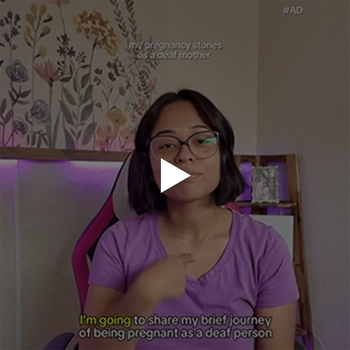🎥 Browse the Pregnancy Center's Webinar Recordings Here
Research-Related Videos:
A Summary of the Pregnancy Health Experiences of Black Deaf and Hard of Hearing Women in the U.S.
In the United States, who you are and the resources you have can impact the quality of healthcare you receive. Research shows that when pregnant women don’t get the health information, support, and healthcare they need, both the mother and baby can be at higher risk of health issues. In this study, we talked to eight Black Deaf and Hard of Hearing women to learn about their pregnancy healthcare experience.

Severe Maternal Morbidity in Deaf or Hard of Hearing Women in the United States
In unadjusted analyses, deaf or hard of hearing (DHH) women were at 80% higher risk for severe maternal morbidity (SMM) during delivery and postpartum compared to non-DHH women. Our findings demonstrate a critical need for inclusive preconception, prenatal, and postpartum care that address conditions that increase the risk for SMM among DHH people.


Our 2-Part Series on Deaf and Hard-of-Hearing Mothers' Experiences
Part One: Pregnancy Outcomes and Disparities for Deaf and Hard-of-Hearing Mothers
Part Two: Deaf and Hard-of-Hearing Mothers’ Experiences with Pregnancy Care: Explaining Disparities

Pregnancy Experiences of Deaf People
In summary plain-language and ASL format:
In extended plain-language and ASL format:

Perinatal Health Risks and Outcomes Among US Women With Self-Reported Disability, 2011–19





